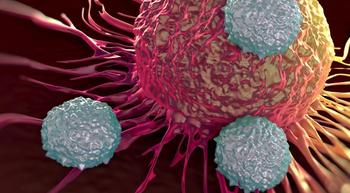
Patients with breast cancer have come to terms that the risks of having reconstructive surgery at this time are too great, according to one expert.

Ryan McDonald, Associate Editorial Director for CURE®, has been with the team since February 2020 and has previously covered medical news across several specialties prior to joining MJH Life Sciences. He is a graduate of Temple University, where he studied journalism and minored in political science and history. He considers himself a craft beer snob and would like to open a brewery in the future. During his spare time, he can be found rooting for all major Philadelphia sports teams. Follow Ryan on Twitter @RMcDonald11 or email him at [email protected].

Patients with breast cancer have come to terms that the risks of having reconstructive surgery at this time are too great, according to one expert.

The Braftovi-Erbitux combination will become the preferred second-line treatment option in treatment of adults with metastatic colorectal cancer (CRC) with a BRAF V600E mutation, according to one expert.

From a skin cancer survivor raising money for the fight against the novel coronavirus to a Cleveland Browns fan who has survived a rare brain tumor helping to open the broadcast of Thursday’s NFL Draft, here’s what is making headlines in the cancer space this week.

The Food and Drug Administration’s approval of Jelmyto (mitomycin gel]) in low-grade upper tract urothelial cancer offers patients a much-needed treatment option, according to one expert.

The Food and Drug Administration’s approval of Imfinzi (durvalumab) in combination with certain standard-of-care chemotherapies in extensive-stage small cell lung cancer offers an exciting option, but doesn’t quite change treatment, according to Dr. Jorge Gomez.

A new genetic test that identifies patients with multiple myeloma who have high-risk genetics may help oncologists find alternative treatment options before the disease progresses.

The COVID-19 pandemic has changed how people receive health care services. For Donna Wiegle, director of the Mill Pond Health Center in Maine, and cervical cancer survivor and patient with ovarian cancer, the pandemic hasn’t yet changed how her island’s health center provides residents with routine care.

The Food and Drug Administration approved Jelmyto to treat patients with low-grade upper tract urothelial cancer.

Patients with relapsed and refractory multiple myeloma (RRMM) who had previously received multiple lines of therapy experienced a durable clinical benefit after receiving melflufen (Oncopeptides) in combination with dexamethasone.

Although the new coronavirus has led to a delay in some cholangiocarcinoma trials, experts don’t expect the trials to come to an end.

Patients who recently had lung cancer surgery are not at a higher risk for getting the new coronavirus unless they are routinely coming in and out of the hospital, according to one expert.

In this episode of the “CURE Talks Cancer” podcast, we spoke with a testicular cancer survivor who is using his love of flying to give back to the community, including volunteering for Pilots N Paws, a nonprofit organization that assists in the transportation of rescue animals and animals in need of medical treatment.

Although the absolute risk for colorectal cancer is very low for young people, one expert warns the incidence is increasing.

The development of an inpatient symptom monitoring intervention, according to researchers, may enhance awareness of patient symptom burden and improve symptom control and health care usage.

The Food and Drug Administration approved Imfinzi in combination with certain standard-of-care chemotherapies in extensive-stage small cell lung cancer, as the therapy improves median overall survival.

Dr. Shelley Johns, a researcher with the Indiana University Melvin and Bren Simon Comprehensive Cancer Center and Regenstrief Institute, offers advice on how survivors and patients with cancer can recognize and manage the stress they may be experiencing as a result of the COVID-19 pandemic.

Estimates indicate that cancer will become the number one leading cause of death in the United States over the next five to 10 years. But, as one expert argued in a policy roundtable, there are ways to significantly decrease that rate.

Here is a list of the recent trial initiations that occurred within the cancer space in March.

A medication that is commonly prescribed to treat depression appeared well tolerated in patients with biochemical recurrent prostate cancer.

The Food and Drug Administration approved an updated dose of Ontruzant, a biosimilar to Herceptin, for multiple cancer types.

Women who use copper intrauterine devices (IUD) as a form of birth control may be at lower risk for high-grade cervical cancer compared with those who use a levonorgestrel-releasing intrauterine system.

Patients with cancer who have routine follow up appointments are being asked to reschedule to help combat the spread of COVID-19.

Patients with prostate cancer who were getting ready to receive androgen‐deprivation therapy (ADT) saw sustained improvements in quality of life and their cardiovascular events risk profile after taking part in a supervised exercise program

Final results of the phase 3 CASPIAN trial show that Imfinzi (durvalumab) in combination with a choice of standard-of-care chemotherapies demonstrates a sustained overall survival benefit in patients with extensive-stage small cell lung cancer.

A breast cancer diagnosis in women younger than 40 may result in disruptions in employment and job-related decisions, as well as a decrease in finances.

Women who consumed the highest level of dietary advanced glycation end products had a higher risk of breast cancer, particularly advanced stage disease, compared with those who consumed the lowest.

Decision regret — ranked on a scale of 0 to 100 — was low in patients with localized disease, with a mean score of 14, and there was no significant difference in decision regret between open versus robotic surgery.

Statins alone, and in combination with metformin, are associated with reductions in mortality in patients with high-risk prostate cancer.

The combination of Kisqali and Faslodex shows improved overall survival in patients with hormone-receptor-positive, HER2-negative advanced breast cancer.

Treatment options for patients with acute myeloid leukemia are limited, especially for older patients, but a new trial looking at novel therapy combinations could change the treatment landscape.